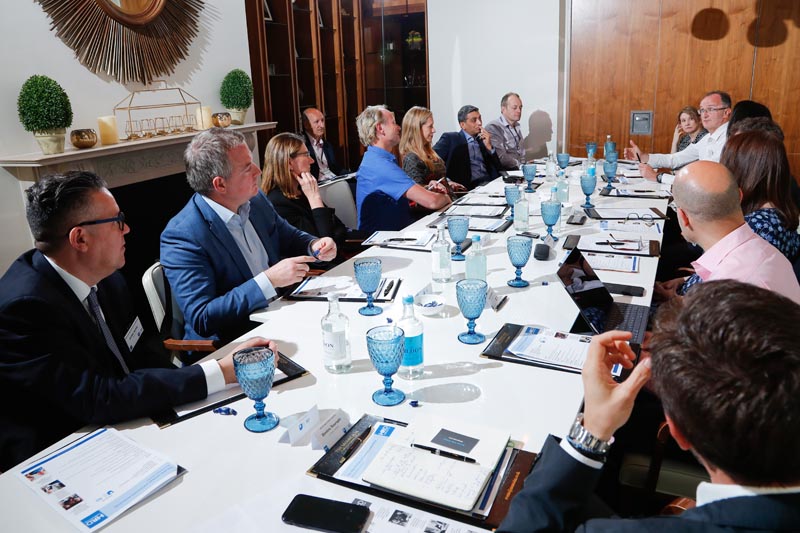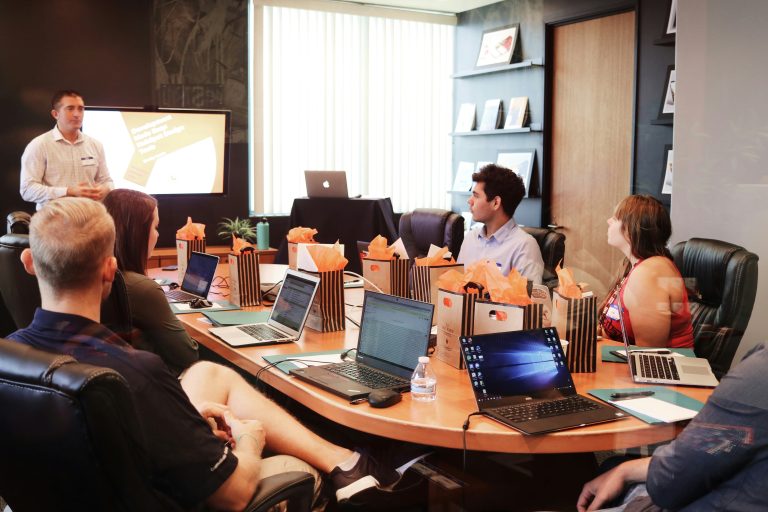Workforces are overstretched, limiting productivity and affecting employee motivation. The rapidly-changing face of business and workplace operations, driven largely by digital technology and changing commercial trends, requires highly-skilled workers with the ability to adapt to new environments that can help organisations to become agile and flexible in the face of future challenges.

DELEGATES
Jordan Archer, Deputy Director of HR & OD – NCL CCGS
Matthew Collington, VP HR Business Partner Western Europe – Iron Mountain
Kirstin Furber, Chief People Officer – Clearscore
Angela Gibson, Senior Manager, Employee Relations – TBS
Paula Leach, Global Chief People Officer – FDM Group
Navid Nazemian, Global Head of HR, Group Finance – Vodafone Group
Jane Nicholson, EU Exit HR Resilience – Cabinet Office
Viren Patel, Director Corporate Sales – The Open University
James Rule, Director, HR Digital Capability – Deutsche Bank
Mike Thompson, Managing Director – SustainHR
Laura Toscano, HR Director, Products & Services – Moog Industrial Group
Dimitris Tsouroplis, HR Director – Lomar Shipping Limited
David Willett, Commercial Director – The Open University
HOW IS THE SKILLS SHORTAGE AFFECTING YOUR CURRENT PRODUCTIVITY?
James Rule: In two broad areas – digital skills and leadership in a digital age – the main focus of the former is about helping people to be more aware and confident of skills they could need to be successful, in what is becoming an evermore digital company. We need to have greater understanding of consumer behaviour, user centric design, design thinking, agile and so on. With regards to the latter, it is about the leadership and softer skills required, with a positive culture.
Mike Thompson: There’s a big shift in skillsets compared to ten years ago, and there needs to be considerable reskilling, with a focus on digital skills, analytical skills and artificial intelligence – the emerging technologies. Companies are struggling to achieve their strategic goals, because they simply don’t have the resource and capability to transform as quickly as they would like.
Matthew Collington: Businesses need to stop taking a short-term investment view and expect to be able to buy skills rather than develop them. There’s the much-discussed trend of short tenure, but that really means businesses need to work harder to win people’s trust to make longer term career planning. We’ll probably discover most of the digital skills are fairly generic no matter what sector. But if we’re inflating wages across a small cadre of the desirable skilled, we’re merely swapping one for another.
Angela Gibson: We’re not experiencing any specific impact on productivity at TSB resulting from skills shortages in the UK. We have, however, recognised that competition continues to increase for great digital and IT talent and growing our own capability in these areas is important to us.
Jordan Archer: Some of our recruitment challenges are from our UK talent pools, and in order to meet our demand within the UK, a lot of our workforce – doctors and nurses – are recruited from overseas. We have to recruit internationally to bolster our talent. But it’s a constant challenge to achieve a sustainable pipeline.
Dimitris Tsouroplis: You can buy the hard skills, but you cannot buy soft skills, you have to train people to gain them. Leadership, definitely is an issue too, as is high levels of attrition.
Laura Toscano: We’re multi-site internationally and the lead time to recruit people is longer than we would like. Therefore, the challenge is to consider if we can base a role elsewhere in a location where we know the skills are more available. That, of course, doesn’t work for all roles.
Kirstin Furber: With digital transformation, we are seeing the impact of skill shortages in a number of ways. For example; skill shortage in tech is resulting in organisations being forced to prioritise their output, potential candidates taking matters into their own hands and developing these skills in their own time, soft skills being prioritised through the recruitment process and organisations supporting on-the-job learning.
Jane Nicholson: We’re looking at how we structure roles so that we’re perhaps less dependent on people in certain locations – the civil service has of course been London-centric – and we’re looking at more flexibility, about how we work and operate, because the skillsets that we need in the service are changing enormously.
David Willett: The Open University’s Business Barometer report we did last year (which surveyed just under 1,000 business leaders), found that the top skills we are short of are leadership, management and digital capability. As an institution that’s the largest university in the UK, with over 170,000 students studying, we also have a responsibility to ensure that what we’re providing to the labour market are people that have the right skills that employers really require. There’s a shift between people wanting to gain a much broader, more transferable set of skills. You can develop an interdisciplinary approach to gaining education and training, if you can pick and mix your education and training to gain a whole range of skills, that will avoid the too narrow and focused skillsets of the past. We’ve gone down this route with apprenticeships and we’re seeing massive impact with how employers are using the levy to upskill existing workforces as the nature of work changes. I think there’s a conversation to be had around the nature of how we develop people, in relation to the type of things they learn: Could it be more interdisciplinary? Could it be more modular? Could it be more flexible? But, also we’re seeing this massive shift towards people being more interested in micro-credentials and how we might deliver that into the workforce is really interesting.
WE OFTEN HEAR THAT EDUCATION AND EMPLOYERS LACK COHESION – SURELY IT MAKES SENSE FOR THE TWO TO BE CLOSE.
Viren Patel: The world of academia would argue that education is all about opening people’s minds, that it’s about that critical thinking. Whereas, business is saying, actually that doesn’t relate to the real world and the environment they operate in, and there’s always going to be that tension. However, there’s has to be a bridge and academia is hopefully going towards that through apprenticeship programmes.
Mike Thompson: Employers complained that the education system wasn’t equipping students with the right type of skills, schools were fixated on sending students to top universities, and employers only considered people with degrees. Apprenticeships have provided another route and it have improved communications between the two.
IN TERMS OF EMPLOYER/EDUCATION COHESION, THE “GERMAN SYSTEM” IS OFTEN CITED AS A BENCHMARK.
Mike Thompson: Yes, it’s been core to the economic success in Germany. At age 14 they’re placing people into technical or academic streams and students move into an employer relationship, with a technical college and an employer, resulting in an apprenticeship. Consequently, youth unemployment is very low, and employers have a resource pipeline.
Jane Nicholson: We need a more modular approach in university in the UK. In Germany you do a module, you have a paid internship and most organisations expect to bring in interns in to do particular projects. So, there is that dynamic of accepting and integrating university graduates as well as the apprentices who come through. Again, in Germany, if you want to take an apprentice you have to have a qualified member of staff who’s able to sign off.
Angela Gibson: Agreed, we have well- established and effective training and development programmes which are core to our business. But we’re also seeing the tangible benefits of our partners having more opportunity to work on projects with multi-disciplinary teams or Agile Squads outside their typical day-to-day role, developing different types of skills. As a result, we‘re starting to see natural growth of curiosity and commercial awareness and capability.
WHAT ARE THE MOST TELLING SKILLS GAPS THAT ARE IMPACTING ON CAPABILITIES AND OPERATIONS?
Kirstin Furber: Authentic Leadership is needed to provide guidelines to encourage idea generation to achieve the overall strategy and ensure everyone is facing in the same direction. During these times, there is even more of a need for companies to put effort into building trust and employees knowing how their work fits into the overall purpose.
Mike Thompson: Agreed, it’s about skills and behaviours – I think you can teach skills, but increasingly what I’m seeing is recruiting for behaviours and attitude. There’s one banking organisation which was developing traders, and they hired purely on behaviours and looked for candidates in very unconventional areas such as housing associations and people leaving the army. Yes, the question is still, “how do we find the right skills”? But increasingly it’s; “how do we make sure people have the right behaviours?”
Jane Nicholson: It could be argued that the civil service became lazy, always recruiting through the same channels, but now there’s been a drive to try and increase diversity and there’s definitely a move towards strengths-based recruitment.
Jordan Archer: Our issues are leadership, management and technical skills, that’s what we need for the future. Thinking about how we’re trying to change and adapt to that, we’re certainly working in more multidisciplinary teams and there’s certainly a shift towards more cross functional teams.
IN TERMS OF SKILLS GAPS AND FILLING THEM, HOW IS IT AFFECTING YOUR OPERATIONS?
Dimitris Tsouroplis: In our group of companies, the gap exists where technology is driving change more rapidly, while in shipping, well it hasn’t changed much in the last 30 years, and that is where we can retain people the longest. Areas of the business that are tech-led, everything moves faster which creates the skills pressure in recruitment.
Laura Toscano: The issue of trust is important, the cultivation of a meritocracy, where the people who you trust with your customers are more involved with aspects of strategy and internal issues in general. On another subject, the increase in work-related stress suggests that resilience and wellbeing training for students and employees would make a lot of sense.
Mike Thompson: Agreed, and that is a practical skills problem, leading to long-term sick with stress or anxiety and other mental health issues and that, of course, impacts on productivity, which is our debate focus today.
IN WHAT WAYS HAVE THE KEY SKILLS SHORTAGES CHALLENGED YOUR RECRUITMENT PLANS?
Viren Patel: Culturally, we need to change the way we think and the way we operate. This is nothing new, we all understand it, it’s just having that ability to open our eyes and look a bit wider. There’s a whole subsection of society out there that we’re actually not even touching. We should be talking to them and moving to hire, based on behaviours rather than just competencies. We need to have a sea change on that, and that takes time, but we need to be driving that.
Matthew Collington: Productivity in the UK isn’t great, and it’s not improving, and we see that our approach over the last ten years has probably been to take disproportionate advantage of low-cost labour. Consequently, investment in young people has not been sufficient. I’m looking to the other side of Brexit disruption and re-establishing a better flow of talent into our organisations, that doesn’t rely upon cheap imported labour. I think this will lead to better productivity and building technical skills, and the right attitudes for collaborative team working is key.
Kirstin Furber: With roles changing and evolving all the time, organisations want to know individuals can evolve with them and work in an environment that is going to support them.
DO YOU ENVISAGE A KIND OF EROSION OF ROLE DESCRIPTIONS AND DEPARTMENTS? HOW HAS THE SKILLS SHORTAGE CHANGED WORKFORCE PLANNING?
Angela Gibson: Traditional approaches to role descriptions are not eroding per-se, but how roles are marketed to attract talent has changed significantly. For candidates, the traditional details of the job described in a template have become far less relevant. Organisational values are at the forefront of candidates’ minds.
James Rule: Organisations are becoming more dynamic and fluid, and we’re increasingly talking about workforce shaping. The question is, how can I organically move my organisation, to actually support the business strategy, in order to use the entire mix of people in the organisation, rather than to try and create convoluted structures and strategies?
Jordan Archer: We try to take a streamlined approach – we have high vacancies across the NHS and are often competing for the same talent with other areas of the health service. So, we are constantly considering where our potential talent pools are, and there are options, but the challenge is considerable.
David Willett: Putting people into boxes makes me feel uncomfortable – that needs to change as I think it is impacting workforce planning and productivity. There needs to be a more fluid approach.
Viren Patel: I agree, if we take the NHS as an example it’s under incredible resourcing pressure. But everyone is having to react to change and the pace of technology. Retention rates aren’t good and there are telling capacity issues. Employers need to switch mindsets from being reactive to planning for the future in a more strategic manner.
HAS THERE BEEN AN INCREASE IN UPSKILLING AND RESKILLING EXISTING EMPLOYEES, AND HOW WOULD YOU ASSESS THE SUCCESS OF THOSE PROGRAMMES?
Mike Thompson: I was in banking at a point when the burning question was, “how do we futureproof our workforce?” Because there was a workforce accustomed to traditional bricks n’ mortar retail banking and the digital age was changing everything at a breath-taking pace. At Barclays, we created 2,000 digital eagles that transformed, and upskilled. You cannot under-estimate how suddenly a really experienced and capable workforce can be negatively impacted by change.
Matthew Collington: Culture is key too, we changed from traditional manager led performance discussions, to a focus on career discussions. I’m a strong believer that performance is mostly about environment, encouragement from a leader to spark that curiosity. It’s not the formal development, it’s sparked from that enthusiasm that gives people time and permission to grow.
Kirstin Furber: At BBC Worldwide, we identified six behaviours to support strategic growth and created a training curriculum with these behaviours as foundations to strengthen organisation capability. The impact was then reviewed through the performance management process and quarterly performance reviews.
Viren Patel: I’ve seen a massive amount of activity around upskilling. If you think about the degree apprenticeship space, the impact of the levy has been significant on upskilling and reskilling of the existing workforce, across the key areas we’ve all been talking about; digital, management and leadership. In addition to that, it’s outside the levy that we’re seeing a lot of employers using our modules and short courses to upskill employees over a shorter time period. We’ve seen a real thirst for driving skills with shorter bite-sized pieces.
David Willett: I think we’ll see growing activity in that space, in the micro-credentials space as well, where people and employers want to gain a credential they could build on. They could use them as building blocks towards a qualification, but at some point in the future, I think we’ll see that activity grow as well in the upskilling space.
WHAT ROUTES TO TRAINING HAVE YOU ADOPTED AND HOW WOULD YOU GAUGE SUCCESS FOR FAR?
Mike Thompson: The levy has driven a greater focus on apprenticeships – along with L&D budgets shrinking over the years – so managers have had to really think about where they spend. But the levy has injected some much-needed funds which must be capitalised on, and spent with impact. The challenge is, how quickly the system is adapting, and having universities partnering with employers more effectively, as opposed to the old academic way of keeping it on campus.
Kirstin Furber: How people learn is evolving from self-learning to face-to-face ‘traditional’ courses. For organisations, it is about curating the learning curriculum so there is focus and prioritisation for employees to learn that will benefit the overall organisational strategy and themselves individually.
KNOWLEDGE SHARING IS REALLY THE NEW L&D PLATFORM. BUT THIS “FREE-FOR-ALL” IS A BIT OF A LEAP OF FAITH IN, SAY HIGHLY REGULATED SECTORS.
Angela Gibson: Indeed, there’s a need for professions to have accreditation or qualifications, finance and legal for example – and I don’t see a move away from this any time soon – but certainly in terms of organisational culture of self-directed learning, it is now more commonplace. Whilst we have a wealth of on-line learning material, we do have to continuously promote it. Individuals can sometimes prefer the interactions of ‘trainer-led’ learning. Whilst a blend can be very effective, having a growth mindset and personal drive to develop your own career requires an open mind to various learning channels and opportunities.
James Rule: There are effectively two ecosystems that share the same technology. One is the system that supports and helps manage the regulatory requirement – the compliance training, red flag monitoring, investment limits and so on – which is more a classical learning environment, and more prescriptive, but even here advances in learning delivery approaches can improve the experience and manage the risk. The second system is the more discretionary learning ecosystem and this is more than just providing a Netflix or YouTube for content. This could be more peer sharing, the ability to aggregate content and greater ease-of- use in bringing in external content and sharing it.
Angela Gibson: Important too is good leadership and managers with the skill and capability to have effective coaching conversations, supporting individuals to organically grow, using self-directed learning – developing these essential skills is paramount.
Jane Nicholson: When I was in the Home Office, it was moving back to being more paternalistic, because our analysis showed there was some avoidance of involvement in self-directed learning – because of work pressure or people didn’t want to show a lack of knowledge in areas they were unsure of. With a more leadership-led, paternal culture, we started to measure a perceptible increase in engagement scores around leadership, and people themselves were much more confident as a result.
James Rule: I dream for the time where we can give that personalised development experience – that we typically provide on senior leadership development programmes – to every individual. Data is key, so that we can be more bespoke and targeted, and also provide that experience, which encourages them to consume more learning and advocate it to their peers.
Laura Toscano: We’re just about to invest in a platform that will help with career planning, talent pooling – where we are able to say: “If your aspiration is to be a general manager in our business, then what skills and capabilities do you need? What do you know, and what are the gaps”? and then pull together as a bespoke programme.
Dimitris Tsouroplis: We need to be in tune with how the younger generation consumes content; Netflix and podcasts, it’s all about choice and time. AI will revolutionise customisations and targeting delivery.
Mike Thompson: And we need to understand what motivates people to learn in the workplace. They want to know how to do the job well, to perform and they want opportunity. Increasingly too, they like a challenge that takes them out of the box and they want to be acknowledged for making a contribution, so setting challenges is a great way to building engagement.
David Willett: What we are talking here is curated content, personal learning and learning subscription models. I think we are moving to being able to serve a blended set of solutions of learning that include really rich media content. I’m a big advocate of online learning, we’re the largest online education provider in Europe – almost eight million people visited our OpenLearn platform last year, and are taking short modular courses that are often for free. So, people are learning online – perhaps not in a corporate environment online – but that might be more about how we try and serve up learning in a corporate, rather than in a social environment.
Viren Patel: Learning is not a tick-box exercise and we need to move away from that. Of course it is required in some sectors for compliance reasons – but moving to a culture where people see L&D as part of their personal development, builds value and engagement and, in turn, it then becomes valuable to the organisation. That’s key to increasing productivity.
HOW HAS THE INTRODUCTION OF THE LEVY IMPACTED YOUR ORGANISATION. HOW HAS IT BEEN UTILISED AND WHAT HAVE BEEN THE POSITIVES AND NEGATIVES?
Kirstin Furber: The levy is an opportunity, but I believe it’s not always linked to the company learning and workforce planning strategy, and to building results for the long term.
Angela Gibson: We’ve previously had small numbers of apprenticeships, but haven’t yet fully drawn from our levy budget. We are changing that this year by launching further apprenticeship programmes in different parts of the Bank. Engaging our leaders has been key to helping to understand the levy and its purpose, as well as the broader definition of an apprenticeship. We’ll need to keep talking about this.
Jordan Archer: I don’t think the levy is very well understood; and the drawdown is not easy to navigate either. Further, we know that there is; Level 3, Level 5 and Level 7 options, but the equity of who applies, who is eligible and how it fits in in with career development, is less well known. I don’t think that bit has been very clearly explained.
Mike Thompson: It is a slow burn. When I was at Barclays, we were official trailblazers, of course, helping to design standards for our sector. I’ve seen the benefits of the levy, and think its taken time to overcome the stigma of the brand of apprenticeship, in a world of degree graduates. The levy is an opportunity to build partnerships with education, to work long-term, build programmes and be targeted and bespoke.
Matthew Collington: It’s harder in some sectors than others of course. Case in point, an organisation like Airbus has always relied very much on apprenticeships, but it can be hard to find the sweet spot in other sectors.
David Willett: It’s taken employers a while to find apprenticeship standards that meet requirements across sectors, making it work with some of the rigour around laws and regulations. There are some levers Government could still pull, that would make it easier for employers, for example; the minimum 12 months is an old legacy around quality in certain types of provision. If that could change, that might help. And the 20 percent off the job would benefit from being more flexible.
CAN SOFT SKILLS CUT THROUGH THE WHITE NOISE OF DIGITAL DISRUPTION AND TECHNOLOGY OVERLOAD?
Angela Gibson: From induction to continuous development, having effective soft skill capability is fundamental to us and we have well-established learning paths for our partners, managers and leaders, as well as an online learning portal which has a variety of soft-skill development materials.
Jordan Archer: Within the NHS, compassionate leadership is a high priority, and stripping that back to just compassion is what we do. It’s about embedding that culture of compassion through leadership, through communication and teamwork. We’re trying to embed this in our staff.
David Willett: I don’t think I’ve met an employer that hasn’t said that these are the most important skills; communication skills, being able to solve problems, having compassion, having resilience, having the ability to work in teams – all clearly vital to business operations and productivity, regardless of the size of the organisation.
Jane Nicholson: Too much focus has been on managing poor performance. We’ve seen this in the civil service, it’s what we call forced distribution, getting rid of the bottom ten percent all the time. It was all about being a robust leader, and softer skills and compassionate leadership, were seen as being weak. When people are constantly worried about their job, they feel no empathy in the organisation, it’s little wonder productivity has gone down and mental health problems up. We are going to have to address this fast.
Viren Patel: Agreed, soft skills are key. Rather than trying to understand the motivations of the team, we’ve lost the art of just having a chat – it’s all about the to-do list, the workload and priorities. It’s become a culture which seems dynamic and productive, but is so corrosive.
Jane Nicholson: I know this is really old-school, but when the tea trolley came round, it was an opportunity to all stop for five minutes and just chat and have a break together. They still take time for this in Germany, by the way…
HOW DO YOU TRAIN TO DEVELOP A PIPELINE FOR JOB ROLES THAT DON’T EXIST YET?
Kirstin Furber: We don’t know what the jobs are going to be in the future. Regardless, we know we will always be solving problems. As people professionals, it’s about developing and facilitating culture where everyone can have their voice heard, their ideas aren’t lost and they can be their best selves. We must not forget the importance of being human. Human organisations will support technologically advanced process, there will be less reliance on organisation structures and more focus on developing ideas to disrupt the market. This creativity and diversity of thought is critical in the competitive world we’re living in.
Matthew Collington: If you’re an organisation that has always pigeon-holed people, you’re going to struggle. Businesses will have to develop a growth mindset towards my people, and encourage them to have a growth mindset too. That entails, high psychological safety, high standards and enabling people to stretch and feel safe to fail. At the heart of that is humanity, no matter where technology takes us.
Jane Nicholson: It’s daunting to try and guess what skills we will need in five-to-ten years’ time, and not knowing where that technology will take us. Having closer links with educational bodies has been a recurring theme of today’s discussion and, coincidentally, at the Department for Transport, we’ve a board of university advisors, working on where the future of transport is heading. So, with that sort of activity filtering through the system, we should be better equipped than just heads down and see what occurs? That helps us then to start creating the future and therefore capabilities. I don’t know about you, but I rather like the idea of finishing up today and catching a flying taxi, rather than fighting my way onto the underground.
Mike Thompson: Creating a learning culture is key because organic, incremental change is far better than big clunking change. I think you have to create a mindset where people know that the world isn’t going to be the same in 12 months’ time and to prepare themselves for that.
Laura Toscano: The future pipeline is key – we’re a very heavy engineering, quite niche firm with amazingly clever people, with a problem-solving culture. I think that is a positive place to be, in order to face the future challenges.
Angela Gibson: I concur, plus we need to change the typical approach to problem solving by tapping into individual skills, and having broad and diverse experiences and skills, from a wider field of potential.
Dimitris Tsouroplis: Half of existing jobs will disappear in the next ten years. What concerns me is how we prepare and train current employees who will be at risk in that future, so that they are employable again. In addition, how do we train them for jobs that don’t exist yet? I think a closer link with academia is a very wise move for businesses.
Jordan Archer: I do feel very strongly about soft skills, you can’t under-estimate the importance of these. You can have the best digital skills in the world, but if you can’t talk to people, you’re not going to progress very far. It’s about developing leaders and colleagues with compassion, and bringing the human back into human resources.
Viren Patel: I reflect on my own career and how that’s developed. I’m a chartered accountant by profession and I’ve now moved into the commercial world. I’ve seen my career develop in a different way through learning new skills and the key element is being confident to take that flexible journey.
David Willett: There is no doubt that we’re going to see the end of linear careers. Young people joining the workforce today undoubtedly will have a portfolio of careers. If I had a blank sheet of paper and was thinking about an approach to developing a pipeline that was based on skills and learning and qualifications, I’d move for a much more interdisciplinary approach. We’d build skills perhaps with micro-credentials that are stackable, that have this interdisciplinary approach. I love the idea of including experiential learning, whether that be an internship, like the German model, or whether it be much shorter bite-sized pieces of internship linked with the stackable qualifications that are interdisciplinary, built on this broad set of employability softer skills. These are the things that I think will equip people for the future.
To read more Roundtable Reports please click HERE
If you are a Senior HR Practitioner and would to take part in one of our complimentary debates, please register your interest HERE
If you would like to sponsor a debate, please click here for more details.









